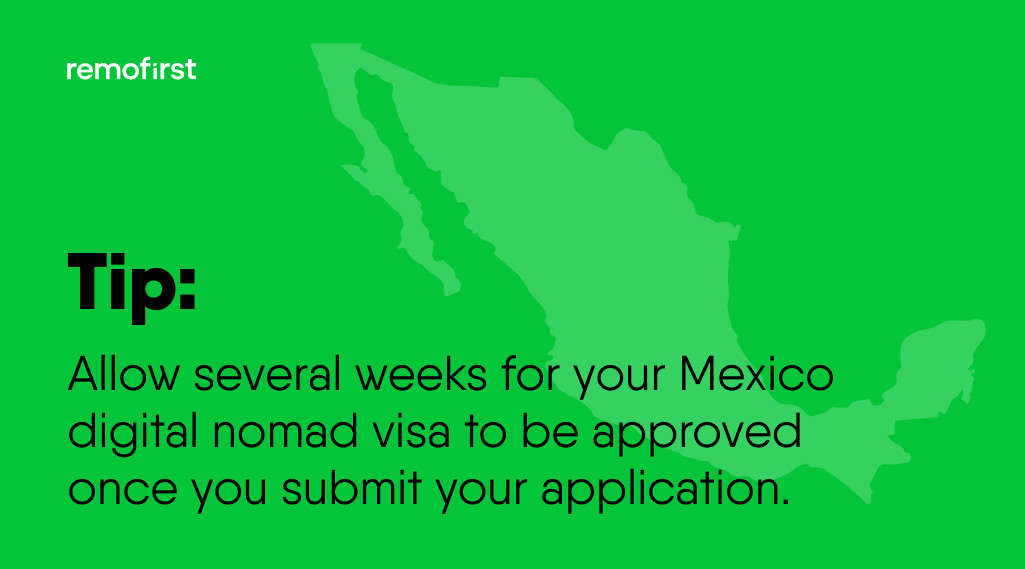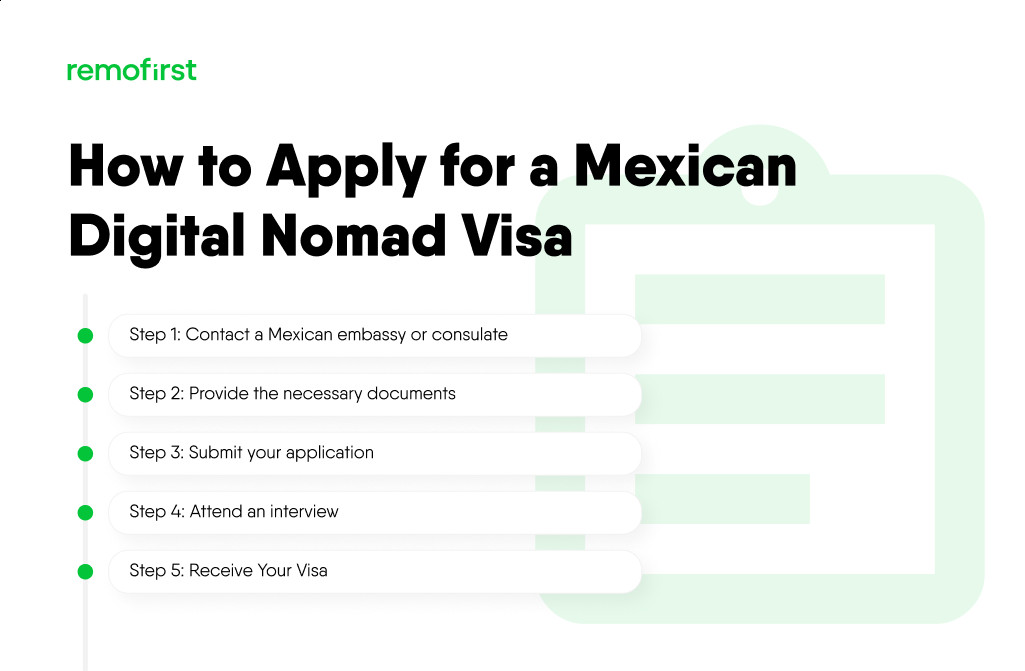Are you a member of the LGBTQ+ community dreaming of working remotely from the sun-kissed beaches and vibrant cities of Mexico? Does Mexico Have A Digital Nomad Visa? Yes, and gaymexico.net is here to guide you through the process, ensuring a smooth transition to your new life in this beautiful country. Discover how you can live, work, and thrive in Mexico as a digital nomad with our expert advice. Unlock the doors to financial independence, explore cultural destinations and experience a sense of belonging.
1. What is a Digital Nomad Visa and Does Mexico Offer One?
Yes, Mexico offers a pathway for digital nomads through its Temporary Resident Visa. This visa allows individuals to live and work in Mexico remotely, providing they meet certain financial and legal requirements. While not specifically labeled a “digital nomad visa,” the Temporary Resident Visa serves the same purpose, enabling you to enjoy the Mexican lifestyle while maintaining your remote work.
- Temporary Resident Visa: This is the official route for digital nomads, allowing stays longer than the typical tourist visa.
- Financial Requirements: You’ll need to prove a certain level of income or savings to qualify.
- Legal Compliance: Ensuring you meet all Mexican immigration requirements is crucial.
2. Who is the Mexican Digital Nomad Visa (Temporary Resident Visa) For?
The Temporary Resident Visa is ideal for:
- Remote Workers: Individuals employed by companies outside of Mexico.
- Freelancers: Those with international clients and a steady income.
- Entrepreneurs: Business owners who can operate their ventures remotely.
- LGBTQ+ Individuals: This is a great option for LGBTQ+ individuals, and gaymexico.net is here to provide resources that ensure inclusivity and safety.
3. What Are the Key Benefits of Living in Mexico as a Digital Nomad?
Living in Mexico as a digital nomad offers numerous advantages:
- Lower Cost of Living: Mexico’s affordability allows you to stretch your budget further.
- Rich Culture: Immerse yourself in a country with a vibrant history and diverse traditions.
- Beautiful Locations: From beaches to mountains, Mexico offers a variety of stunning landscapes.
- LGBTQ+ Friendly Destinations: Cities like Puerto Vallarta and Mexico City are known for their welcoming LGBTQ+ communities.
- Proximity to the U.S.: Easy travel back and forth for those with ties to the United States.
4. What are the Requirements for Mexico’s Digital Nomad (Temporary Resident) Visa?
To obtain a Temporary Resident Visa, you generally need to provide:
- Valid Passport: With at least six months of validity remaining.
- Proof of Income: Bank statements or pay stubs demonstrating sufficient monthly income.
- Proof of Health Insurance: Coverage valid in Mexico.
- Criminal Background Check: Ensuring you have a clean record.
- Visa Application Form: Completed and submitted to the Mexican consulate.
5. How Much Income Do I Need to Qualify for the Digital Nomad Visa in Mexico?
While the exact amount can vary, a general guideline is:
- Monthly Income: Approximately $2,600 USD per month.
- Savings: Alternatively, a substantial amount in savings can also qualify you.
These figures are subject to change, so it’s always best to check with the Mexican consulate for the most current information.
6. What Documentation Do I Need to Apply for a Mexican Temporary Resident Visa?
Gathering the right documents is critical for a successful application. Here’s a detailed list:
| Document | Description |
|---|---|
| Valid Passport | Must have at least six months of validity remaining. |
| Visa Application Form | Obtainable from the Mexican consulate or embassy. |
| Recent Passport Photo | Adhering to specific size and background requirements. |
| Proof of Income | Bank statements, pay stubs, or employment contracts demonstrating stable income. |
| Proof of Health Insurance | Policy that covers you in Mexico. |
| Criminal Background Check | Official document from your home country verifying your criminal history. |
| Letter from Employer/Clients | If self-employed, letters from clients confirming your remote work arrangement. |
| Proof of Address | Utility bill or lease agreement from your home country. |
7. What is the Application Process for the Digital Nomad Visa in Mexico?
The application process typically involves these steps:
- Contact the Mexican Consulate: Schedule an appointment and confirm specific requirements.
- Gather Documents: Collect all necessary documents as outlined above.
- Submit Application: Submit your application and pay the visa fee.
- Attend Interview: Participate in an interview with a consular officer.
- Receive Visa: If approved, receive your Temporary Resident Visa.
8. Can LGBTQ+ Digital Nomads Find a Welcoming Community in Mexico?
Absolutely! Mexico has several cities known for their vibrant and accepting LGBTQ+ communities:
- Puerto Vallarta: A premier LGBTQ+ destination with numerous gay-friendly resorts and businesses.
- Mexico City: Offers a thriving LGBTQ+ scene with cultural events and nightlife.
- Guadalajara: Known for its inclusive atmosphere and annual Pride celebrations.
- San Miguel de Allende: A beautiful, colonial city with a growing LGBTQ+ population.
Gaymexico.net provides detailed guides and resources to help you find the best spots and connect with the local LGBTQ+ community.
9. What are Some Tips for LGBTQ+ Digital Nomads Moving to Mexico?
- Research LGBTQ+ Friendly Areas: Focus on cities with established LGBTQ+ communities.
- Learn Basic Spanish: Knowing some Spanish will enhance your experience and help you connect with locals.
- Join Local LGBTQ+ Groups: Networking can provide support and friendship.
- Stay Informed: Keep up-to-date on local laws and customs affecting the LGBTQ+ community.
- Be Aware of Public Displays of Affection: While many areas are accepting, it’s wise to be mindful of local norms.
 Puerto Vallarta Mexico LGBTQ+ Friendly
Puerto Vallarta Mexico LGBTQ+ Friendly
10. What are the Potential Challenges for Digital Nomads in Mexico?
While Mexico offers many benefits, it’s important to be aware of potential challenges:
- Language Barrier: Although English is spoken in tourist areas, learning Spanish is beneficial.
- Cultural Differences: Understanding and respecting local customs is essential.
- Bureaucracy: Navigating paperwork and legal processes can be complex.
- Safety Concerns: While many areas are safe, it’s important to be aware of your surroundings and take precautions.
- Healthcare Access: Ensure you have adequate health insurance and access to quality medical care.
11. What is the Cost of Living Like in Mexico Compared to the United States?
Generally, the cost of living in Mexico is significantly lower than in the United States:
- Rent: Expect to pay considerably less for housing, especially outside of major tourist areas.
- Food: Groceries and dining out are more affordable.
- Transportation: Public transportation is inexpensive, and ride-sharing services are readily available.
- Healthcare: Medical care is generally less expensive, though quality can vary.
12. How Can gaymexico.net Help LGBTQ+ Digital Nomads in Mexico?
Gaymexico.net is your go-to resource for all things LGBTQ+ in Mexico:
- Comprehensive Guides: Detailed information on LGBTQ+ friendly destinations, events, and businesses.
- Community Connections: Connect with local LGBTQ+ groups and individuals.
- Safety Tips: Advice on staying safe and navigating local customs.
- Up-to-Date Information: The latest news and resources relevant to the LGBTQ+ community in Mexico.
- Personal Stories: First-hand accounts from LGBTQ+ individuals living and traveling in Mexico.
13. What Are Some Popular Destinations for Digital Nomads in Mexico?
Mexico offers a variety of destinations that cater to different lifestyles:
- Mexico City: A vibrant metropolis with a rich cultural scene.
- Puerto Vallarta: A beachside paradise known for its LGBTQ+ community.
- Oaxaca: Offers a more relaxed pace of life with a focus on culture and cuisine.
- Guadalajara: Combines modern amenities with traditional Mexican charm.
- Tulum: A laid-back beach town with stunning natural beauty.
14. Can I Extend My Temporary Resident Visa in Mexico?
Yes, you can extend your Temporary Resident Visa for up to four years. To do so, you’ll need to apply for an extension at least 30 days before your current visa expires. You’ll need to provide updated documentation, including proof of income and health insurance.
15. What Happens After Four Years on a Temporary Resident Visa?
After four years, you have a couple of options:
- Apply for Permanent Residency: If you meet the requirements, you can apply for permanent residency, allowing you to live in Mexico indefinitely.
- Leave and Reapply: You can leave Mexico and reapply for a new Temporary Resident Visa.
16. Are There Any Tax Implications for Digital Nomads in Mexico?
Yes, tax implications are an important consideration. If you spend more than 183 days in Mexico, you may be considered a tax resident. This means you’ll be subject to Mexican income tax on your worldwide income. It’s best to consult with a tax professional to understand your obligations and explore options for avoiding double taxation.
17. How Reliable is Internet Access in Mexico for Digital Nomads?
Internet access in Mexico can vary depending on the location:
- Major Cities: Generally have reliable high-speed internet.
- Tourist Areas: Offer decent internet connectivity.
- Rural Areas: Internet access may be limited or unreliable.
It’s always a good idea to research internet options in your chosen location and consider investing in a mobile hotspot for backup.
18. What Type of Health Insurance Do I Need to Live in Mexico?
You’ll need health insurance that is valid in Mexico. Options include:
- International Health Insurance: Policies designed for expats and digital nomads.
- Mexican Public Healthcare: Available to legal residents, but may have limitations.
- Private Mexican Health Insurance: Offers more comprehensive coverage and access to private hospitals.
19. How Can I Find Accommodation as a Digital Nomad in Mexico?
There are several ways to find accommodation:
- Airbnb: Popular for short-term rentals.
- Long-Term Rental Websites: Sites like https://www.expat.com/en/housing/north-america/mexico/ offer long-term rental options.
- Local Real Estate Agents: Can help you find apartments or houses for rent.
- Facebook Groups: Expats and digital nomad groups often share accommodation listings.
20. What Are Some Cultural Norms to Be Aware of in Mexico?
Understanding local customs is crucial for a positive experience:
- Greetings: Handshakes are common, and cheek kisses are used among friends and family.
- Punctuality: Mexicans are generally more relaxed about time.
- Tipping: Tipping is customary in restaurants and for services.
- Dress Code: Dress modestly, especially when visiting religious sites.
- Language: Learning basic Spanish phrases is highly appreciated.
21. Is Mexico a Safe Country for Digital Nomads?
While Mexico has areas with safety concerns, many regions are perfectly safe for digital nomads. It’s essential to:
- Research Your Destination: Check travel advisories and local news.
- Avoid High-Risk Areas: Steer clear of areas known for crime or violence.
- Take Precautions: Be aware of your surroundings, avoid walking alone at night, and secure your belongings.
- Trust Your Instincts: If a situation feels unsafe, remove yourself immediately.
22. What Are Some Resources for Learning Spanish Before Moving to Mexico?
Learning Spanish will greatly enhance your experience in Mexico. Consider these resources:
- Duolingo: A free and popular language learning app.
- Babbel: Offers structured language courses.
- Rosetta Stone: A comprehensive language learning program.
- Online Tutors: Platforms like iTalki connect you with native Spanish speakers.
- Language Exchange Partners: Find someone to practice with through websites like HelloTalk.
23. How Can I Stay Connected with Other Digital Nomads in Mexico?
Connecting with other digital nomads can provide support, friendship, and valuable insights. Try these options:
- Facebook Groups: Join digital nomad groups specific to Mexico.
- Coworking Spaces: Offer a professional workspace and networking opportunities.
- Meetup.com: Find local digital nomad meetups and events.
- Online Forums: Engage in discussions and ask questions on digital nomad forums.
24. What are the Best Times of Year to Visit Mexico as a Digital Nomad?
The best time to visit Mexico depends on your preferences:
- Dry Season (December to April): Pleasant weather with less rain, ideal for outdoor activities.
- Shoulder Seasons (May, November): Fewer crowds and mild weather.
- Rainy Season (June to October): Lower prices and lush landscapes, but expect more rain.
 Digital Nomad Mexico City
Digital Nomad Mexico City
25. What Are Some Fun Activities for Digital Nomads to Do in Mexico?
Mexico offers a wide range of activities to enjoy:
- Explore Ancient Ruins: Visit Mayan and Aztec sites like Chichen Itza and Teotihuacan.
- Relax on Beaches: Enjoy the Caribbean coast in Tulum or the Pacific coast in Puerto Vallarta.
- Experience Local Cuisine: Sample delicious Mexican dishes like tacos, enchiladas, and mole.
- Attend Festivals: Participate in vibrant celebrations like Dia de los Muertos and Cinco de Mayo.
- Learn to Surf: Take surf lessons in popular beach towns.
- Hike Volcanoes: Climb dormant volcanoes for stunning views.
26. How Can I Ensure a Smooth Transition to Life in Mexico?
A smooth transition involves:
- Thorough Research: Learn about your chosen destination and its culture.
- Financial Planning: Create a budget and ensure you have sufficient funds.
- Legal Compliance: Obtain the necessary visas and permits.
- Health Preparation: Get necessary vaccinations and health insurance.
- Community Building: Connect with other expats and locals.
- Open Mind: Be prepared for cultural differences and embrace new experiences.
27. What are the Latest Updates Regarding Mexico’s Digital Nomad Policies?
As of late 2024, Mexico is actively considering further streamlining its visa process for digital nomads. Stay tuned to gaymexico.net for the most current updates and policy changes.
28. How Does Mexico’s Visa Compare to Other Digital Nomad Visas?
Mexico’s Temporary Resident Visa is competitive but requires careful preparation. Compared to other countries, Mexico offers:
- Similar Income Requirements: In line with many other digital nomad programs.
- Straightforward Application Process: Though detailed, the process is well-defined.
- Renewable Options: Allows for extended stays up to four years.
- LGBTQ+ Friendly Environment: Mexico stands out as a welcoming destination for LGBTQ+ digital nomads.
29. What are the Best Coworking Spaces in Mexico?
Coworking spaces provide a productive environment and networking opportunities. Some top options include:
- WeWork (Mexico City): A well-known international chain.
- Homework (Guadalajara): A popular spot for local entrepreneurs.
- Selina (Various Locations): Offers a mix of coworking and coliving options.
- The Nest (Puerto Vallarta): A community-focused coworking space.
30. Where Can I Find More Information About Living as a Digital Nomad in Mexico?
For more information, be sure to check out these resources:
- Gaymexico.net: Your ultimate guide to LGBTQ+ life in Mexico.
- Mexican Embassy/Consulate: Official information on visa requirements.
- Expat Forums: Connect with other expats living in Mexico.
- Digital Nomad Blogs: Get insights from experienced digital nomads.
Embarking on a digital nomad adventure in Mexico is an exciting prospect. With the right preparation and resources, you can enjoy a fulfilling and enriching experience. Let gaymexico.net be your trusted companion as you explore the beauty and diversity of Mexico.
Ready to make your digital nomad dreams a reality? Visit gaymexico.net today for comprehensive guides, community connections, and everything you need to thrive as an LGBTQ+ digital nomad in Mexico.
For further assistance, contact us at:
Address: 3255 Wilshire Blvd, Los Angeles, CA 90010, United States
Phone: +1 (213) 380-2177
Website: gaymexico.net
FAQ: Mexico Digital Nomad Visa
1. Is there really a Digital Nomad Visa in Mexico?
Mexico doesn’t technically have a visa labeled “Digital Nomad Visa.” However, the Temporary Resident Visa functions as one, allowing remote workers to live and work in Mexico legally.
2. What are the financial requirements for Mexico’s Temporary Resident Visa?
You generally need to prove a monthly income of around $2,600 USD or have a substantial amount in savings to qualify for the Temporary Resident Visa.
3. How long can I stay in Mexico with the Temporary Resident Visa?
The Temporary Resident Visa is initially valid for one year, and you can renew it for up to three additional years, allowing a total stay of four years.
4. Can I apply for the Temporary Resident Visa from within Mexico?
It is generally recommended to apply for the Temporary Resident Visa at a Mexican consulate or embassy in your home country before entering Mexico.
5. Do I need health insurance to get the Temporary Resident Visa?
Yes, proof of health insurance valid in Mexico is a mandatory requirement for obtaining the Temporary Resident Visa.
6. Is Mexico a safe country for LGBTQ+ digital nomads?
Mexico has many safe and welcoming cities for LGBTQ+ individuals, such as Puerto Vallarta and Mexico City. However, it’s essential to research your destination and take necessary precautions.
7. Can I bring my family with me on the Temporary Resident Visa?
Yes, you can include your dependents (spouse and children) in your Temporary Resident Visa application, provided you meet the financial requirements for each family member.
8. What happens if I overstay my visa in Mexico?
Overstaying your visa can result in fines, detention, and potential deportation. It’s crucial to adhere to the terms of your visa and apply for an extension if needed.
9. Are there any language requirements for the Temporary Resident Visa?
No, there are no official language requirements for obtaining the Temporary Resident Visa. However, learning Spanish is highly recommended for a better experience in Mexico.
10. Can I work for a Mexican company while on the Temporary Resident Visa?
The Temporary Resident Visa is intended for remote workers employed by companies outside of Mexico. If you plan to work for a Mexican company, you’ll need a different type of visa.

